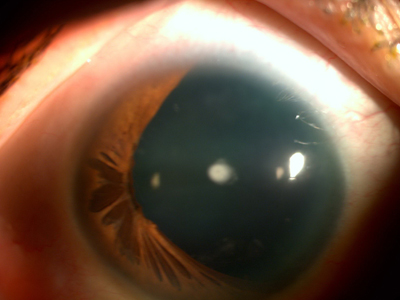Prosthetic Lenses
Prosthetic contact lenses are generally used to cosmetically improve the appearance of patients with an eye disfigurement. A soft prosthetic lens can even be hand painted to match the appearance of the healthy fellow eye of an individual, and can provide both a cosmetic and an optical solution for the eye affected.

Prosthetic contact lenses are generally used to cosmetically improve the appearance of patients with an eye disfigurement. A soft prosthetic lens can even be hand painted to match the appearance of the healthy fellow eye of an individual, and can provide both a cosmetic and an optical solution for the eye affected. In the case that the affected eye has been traumatized by a penetrating injury, the prosthetic contact lens also assists in the reduction of excessive light entering the eye and therefore eliminating photophobia (particular light sensitivity).
Eye disfigurements can be caused by a birth defect, injury/trauma or eye disease. Examples of problems that can be helped by prosthetic lenses include:
- Eye trauma-especially penetrating trauma affecting the anterior part of the eye and especially the iris (coloured tissue protecting the internal parts of the eye)
- Eye injury-including chemical burns affecting the cornea (the transparent outermost tissue of the eye)
- Poor nutrition-most importantly Vitamin A deficiencies
- Albinism-this is the congenital lack of pigment which in the eye causes photophobia (severe light sensitivity)
- Aniridia- this is the absence of the iris and can be caused by trauma or can be present from birth. Special prosthetic lenses can be designed to block excess light from reaching the back of the eye in order to reduce glare and increase comfort
- Coloboma-this is a disfigurement of the iris, either caused by surgery or can be present from birth
- Amblyopia-more commonly known as ‘lazy eye’, the prosthetic lens is used to block the images seen by the better eye, to strengthen the eye with the poorer vision
- Diplopia-this is known as double vision, the prosthetic lens serves as a blocker (occluder) in front of one eye, to eliminate double vision in patients with temporary or permanent diplopia
- Eye squints-the ‘crossed eyed’ appearance can be masked with the use of a prosthetic lens
Prosthetic lenses can be matched to the appearance of a healthy eye by using a pre-made manufactured lens or by ordering a custom-painted contact lens after sending a close up picture of the healthy eye to the contact lens manufacturer. The result is surprisingly amazing and prosthetic lenses can also be produced to the patients’ individual prescription. They can of course be provided without a corrective power if one is not needed and in this case, they simply provide a more natural appearance to a blind or a disfigured eye.
Prosthetic contact lens fitting
In order to be fitted with prosthetic lenses, you need to initially have a full, comprehensive eye exam during which your optometrist will rule out conditions that might interfere with successful prosthetic contact lens wear. Prosthetic lenses are fitted in the same way as conventional lenses but a few extra measurements might be required. Your optometrist may also take close-up colour photographs of your eyes. These will be sent to the prosthetic contact lens manufacturer to help the lab to create a prosthetic lens that matches your natural eye colour and appearance as closely as possible.
Most prosthetic lenses can be worn in the same fashion as conventional lenses. Most prosthetic lenses can be cleaned and disinfected using the same multipurpose contact lens solutions recommended for conventional lenses.
What is certain about prosthetic lens fitting is that with or without an optical correction, with or without a semi-blocking or complete blocking light effect, a prosthetic lens provides an immense amount of psychological relief to patients with an eye disfigurement. It would be a great oversight to understate the psychological implications of a disfigured eye…. As a result, the successful implementation of a prosthetic contact lens, results in improved quality of life, regained confidence and immense satisfaction.


